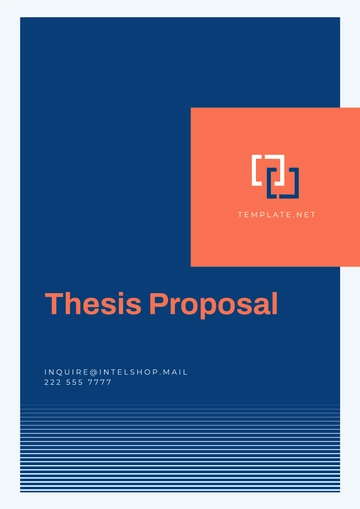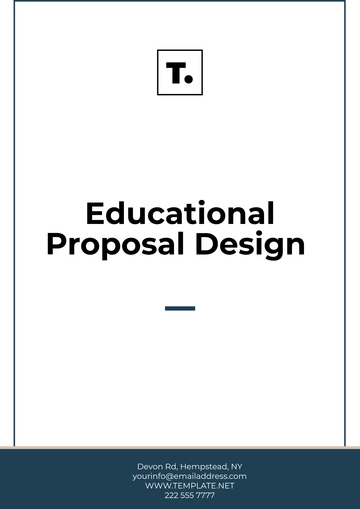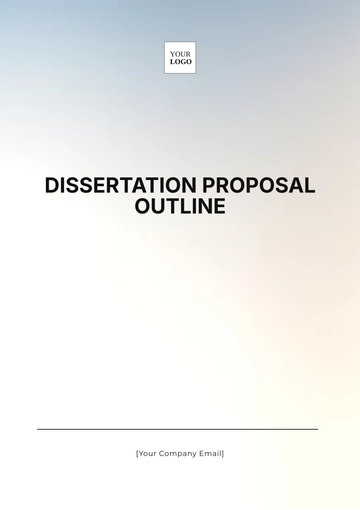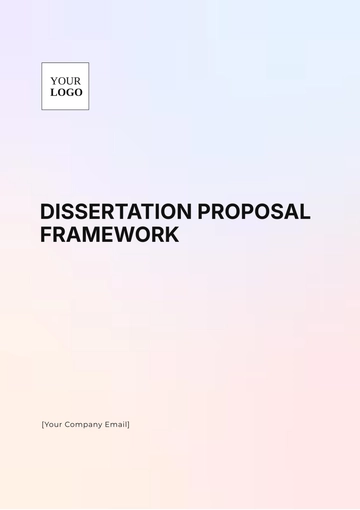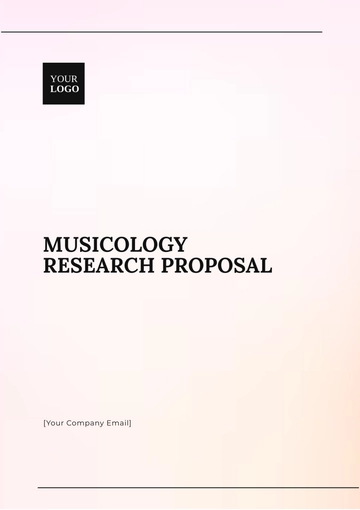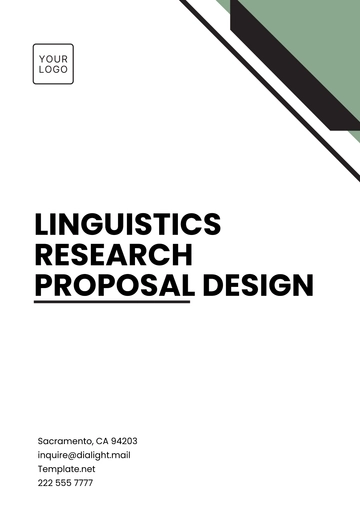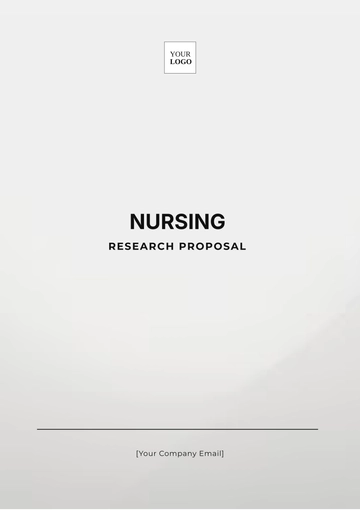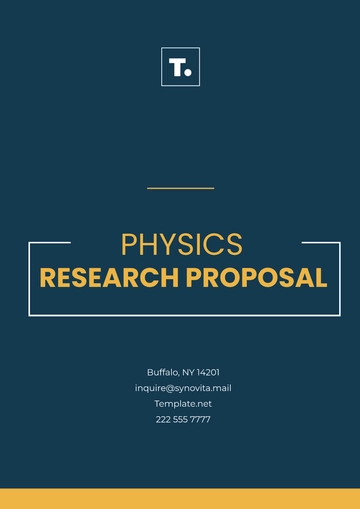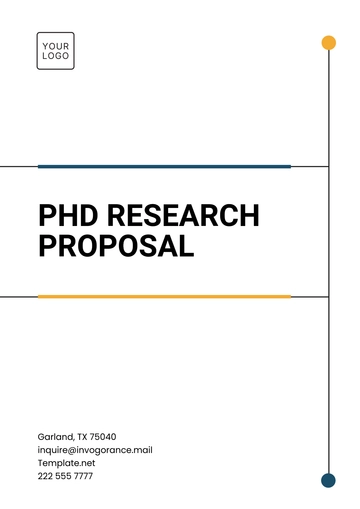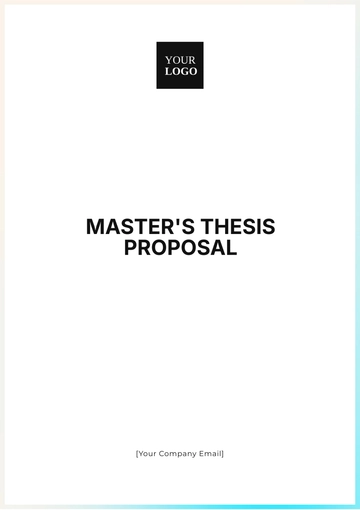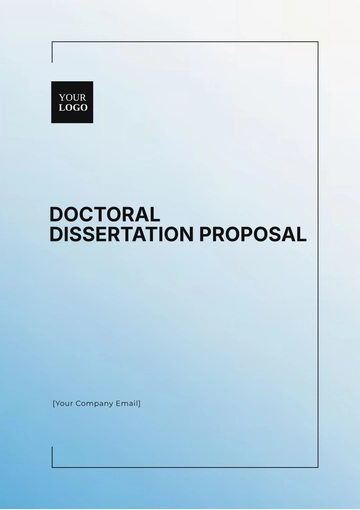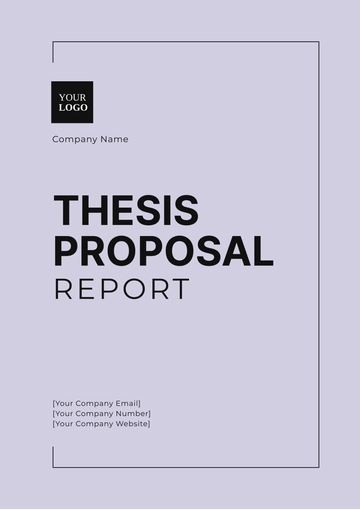Free Dissertation Proposal Outline
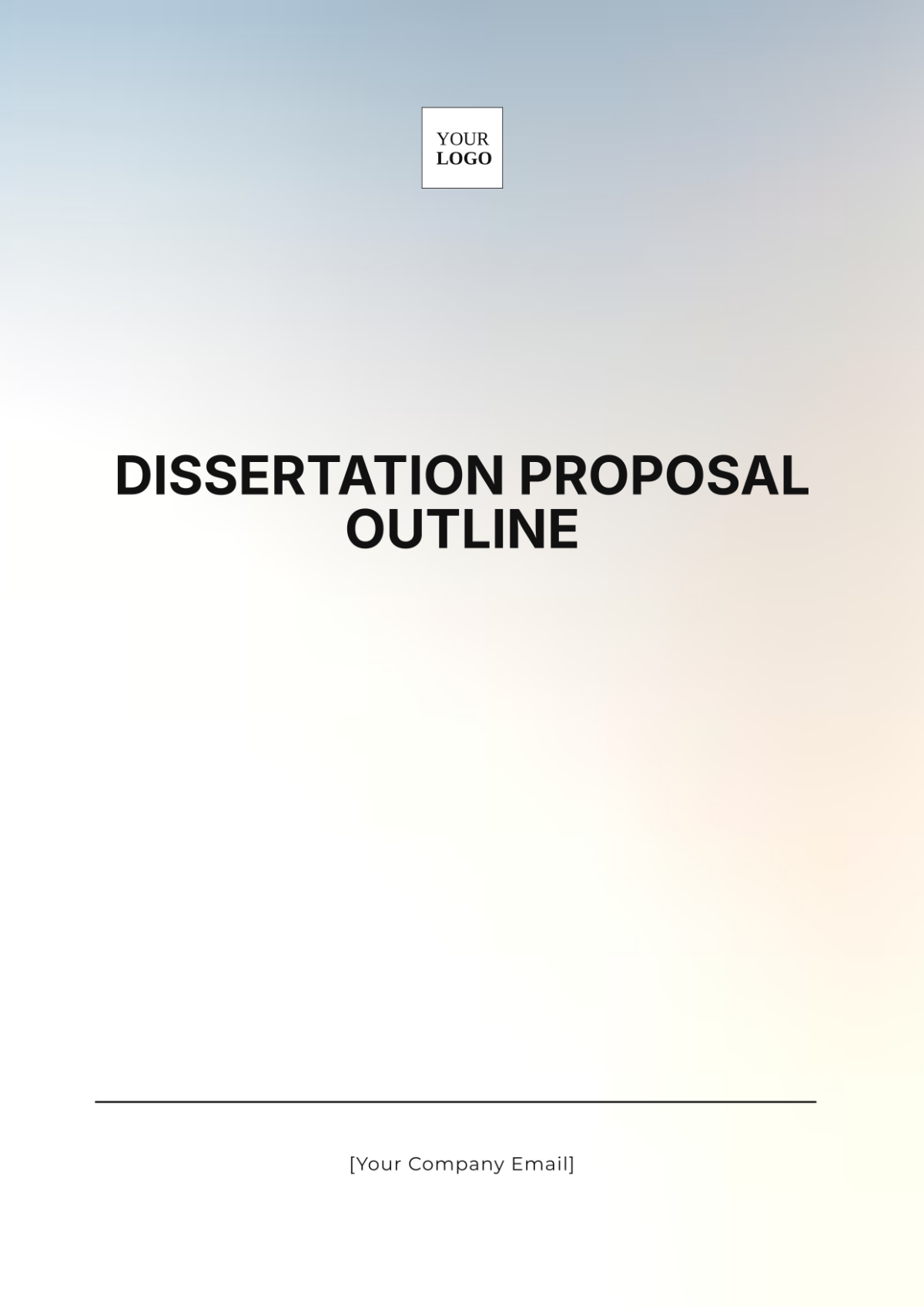
Prepared by: [Your Name]
Date: [Date]
1. Abstract
The Dissertation Proposal Outline provides a structured plan for examining the impact of artificial intelligence (AI) on decision-making processes in healthcare. This research aims to explore how AI-driven tools can enhance diagnostic accuracy and improve patient outcomes. The proposal outlines the research objectives, methodology, and anticipated contributions to the field, offering a roadmap for conducting the study and ensuring it meets academic and practical standards.
2. Introduction
2.1 Purpose and Significance
The purpose of this dissertation is to investigate the role of AI technologies in transforming decision-making processes within healthcare systems. With the increasing integration of AI tools, understanding their impact on diagnostic accuracy and patient management is crucial. This research will contribute to optimizing healthcare practices and advancing the use of AI in clinical settings.
Research Area: Artificial Intelligence in Healthcare
Research Problem: The effectiveness and accuracy of AI-driven diagnostic tools compared to traditional methods.
Significance: Enhancing diagnostic precision and patient outcomes through advanced AI technologies.
2.2 Background Information
The integration of AI in healthcare has seen significant advancements, with AI tools now being used for diagnostic imaging, predictive analytics, and personalized treatment plans. This background provides an overview of the historical development of AI in healthcare, current technological trends, and key theories supporting AI applications in clinical decision-making.
Historical Context: Early AI applications in healthcare began in the 1980s, with significant advancements in machine learning and neural networks over the decades.
Current Trends: Recent developments include AI-driven diagnostic platforms, predictive analytics for patient outcomes, and AI-assisted robotic surgeries.
Key Theories/Concepts: Machine learning algorithms, predictive analytics, and the theory of AI-enhanced decision support systems.
3. Literature Review
3.1 Overview of Existing Research
The literature review synthesizes existing studies on AI applications in healthcare, highlighting gaps in the research and establishing the need for further investigation. Key studies indicate that while AI can significantly enhance diagnostic accuracy, challenges remain in integrating these tools effectively into clinical practice.
Key Studies:
Smith, J., & Jones, M. (2050). "AI in Diagnostic Imaging: A Review." Journal of Healthcare Technology, 15(4), 234-250.
Doe, A., et al. (2053). "Predictive Analytics in Patient Management." Medical Informatics Quarterly, 22(3), 112-130.
Research Gaps: Limited studies on the comparative effectiveness of AI tools versus traditional diagnostic methods.
Justification: The proposed research aims to fill these gaps by providing empirical evidence on AI's impact on diagnostic accuracy.
3.2 Theoretical Framework
The theoretical framework for this research is based on the concept of AI-enhanced decision support systems. This framework will guide the analysis of how AI tools influence decision-making processes in healthcare.
Framework Overview: The AI-enhanced decision support system framework focuses on the integration of AI technologies to improve clinical decision-making and patient management.
Application: The framework will be applied to evaluate AI tools' effectiveness in diagnostic accuracy and patient outcomes.
4. Research Questions/Hypotheses
4.1 Research Questions
The research questions guiding this dissertation are as follows:
A. Primary Questions:
How do AI-driven diagnostic tools compare in accuracy to traditional diagnostic methods?
What impact do AI tools have on patient management and treatment outcomes?
B. Secondary Questions:
What are the challenges and limitations of integrating AI tools into clinical practice?
How do healthcare professionals perceive the use of AI in diagnostic processes?
4.2 Hypotheses
The hypotheses to be tested in this research are:
Null Hypothesis (H0): AI-driven diagnostic tools do not significantly improve diagnostic accuracy compared to traditional methods.
Alternative Hypothesis (H1): AI-driven diagnostic tools significantly enhance diagnostic accuracy compared to traditional methods.
5. Methodology
5.1 Research Design
The research design will employ a mixed-methods approach, combining quantitative and qualitative methods to provide a comprehensive analysis of AI tools' impact on diagnostic accuracy and patient management.
Design Type: Mixed methods (quantitative and qualitative).
Rationale: A mixed-methods approach allows for a robust analysis of both statistical data and personal experiences of healthcare professionals.
5.2 Data Collection Methods
Data will be collected through a combination of surveys, interviews, and analysis of diagnostic outcomes.
A. Sampling Techniques:
Surveys: Random sampling of healthcare professionals using AI diagnostic tools.
Interviews: Purposive sampling of key stakeholders in healthcare AI implementation.
B. Data Sources:
Surveys: Online questionnaires distributed to healthcare providers.
Interviews: Semi-structured interviews with clinicians and AI specialists.
C. Instruments:
Surveys: Structured questionnaires assessing perceptions and experiences.
Interviews: Interview guides focusing on the integration and impact of AI tools.
5.3 Data Analysis Techniques
Data analysis will include statistical analysis for quantitative data and thematic analysis for qualitative data.
Analysis Methods:
Quantitative: Statistical tests to compare diagnostic accuracy rates.
Qualitative: Thematic analysis to identify common themes in interviews.
Software Tools: SPSS for statistical analysis and NVivo for qualitative data analysis.
6. Expected Results
6.1 Anticipated Findings
The research is expected to reveal that AI-driven diagnostic tools significantly improve diagnostic accuracy and patient outcomes compared to traditional methods. Challenges related to AI integration and healthcare professionals' perceptions will also be identified.
Expected Outcomes: Enhanced diagnostic accuracy and better patient management through AI tools.
Implications: Insights into the effectiveness of AI in healthcare and recommendations for improving AI tool integration.
6.2 Contribution to the Field
This research will contribute to the field by providing empirical evidence on the benefits and challenges of AI in healthcare diagnostics. It will advance theoretical understanding and offer practical recommendations for integrating AI tools into clinical practice.
Theoretical Contributions: Expansion of knowledge on AI-enhanced decision support systems.
Practical Contributions: Guidelines for effective AI tool implementation in healthcare settings.
7. Timeline
7.1 Research Phases
The timeline for completing the dissertation is outlined below:
Phase | Description | Timeline |
|---|---|---|
Proposal Development | Writing and revising the proposal | January 2050 - March 2050 |
Literature Review | Conducting literature review | April 2050 - June 2050 |
Data Collection | Gathering data | July 2050 - October 2050 |
Data Analysis | Analyzing data | November 2050 - January 2051 |
Writing | Drafting and revising dissertation | February 2051 - May 2051 |
Defense Preparation | Preparing for defense | June 2051 - July 2051 |
Final Submission | Submitting final dissertation | August 2051 |
8. References
Anderson, L. (2054). Artificial Intelligence in Medicine: Principles and Practices. HealthTech Publishing.
Smith, J., & Jones, M. (2050). "AI in Diagnostic Imaging: A Review." Journal of Healthcare Technology, 15(4), 234-250.
Doe, A., et al. (2053). "Predictive Analytics in Patient Management." Medical Informatics Quarterly, 22(3), 112-130.
National Institute of Health. (2054). "AI and Healthcare: The Future."
- 100% Customizable, free editor
- Access 1 Million+ Templates, photo’s & graphics
- Download or share as a template
- Click and replace photos, graphics, text, backgrounds
- Resize, crop, AI write & more
- Access advanced editor
Elevate your research with the Dissertation Proposal Outline Template from Template.net. This fully editable and customizable template allows you to tailor your proposal effortlessly. Use our AI Editor Tool for seamless edits and personalized adjustments. Streamline your dissertation planning with this professional, versatile tool designed to fit your unique academic needs.
You may also like
- Business Proposal
- Research Proposal
- Proposal Request
- Project Proposal
- Grant Proposal
- Photography Proposal
- Job Proposal
- Budget Proposal
- Marketing Proposal
- Branding Proposal
- Advertising Proposal
- Sales Proposal
- Startup Proposal
- Event Proposal
- Creative Proposal
- Restaurant Proposal
- Blank Proposal
- One Page Proposal
- Proposal Report
- IT Proposal
- Non Profit Proposal
- Training Proposal
- Construction Proposal
- School Proposal
- Cleaning Proposal
- Contract Proposal
- HR Proposal
- Travel Agency Proposal
- Small Business Proposal
- Investment Proposal
- Bid Proposal
- Retail Business Proposal
- Sponsorship Proposal
- Academic Proposal
- Partnership Proposal
- Work Proposal
- Agency Proposal
- University Proposal
- Accounting Proposal
- Real Estate Proposal
- Hotel Proposal
- Product Proposal
- Advertising Agency Proposal
- Development Proposal
- Loan Proposal
- Website Proposal
- Nursing Home Proposal
- Financial Proposal
- Salon Proposal
- Freelancer Proposal
- Funding Proposal
- Work from Home Proposal
- Company Proposal
- Consulting Proposal
- Educational Proposal
- Construction Bid Proposal
- Interior Design Proposal
- New Product Proposal
- Sports Proposal
- Corporate Proposal
- Food Proposal
- Property Proposal
- Maintenance Proposal
- Purchase Proposal
- Rental Proposal
- Recruitment Proposal
- Social Media Proposal
- Travel Proposal
- Trip Proposal
- Software Proposal
- Conference Proposal
- Graphic Design Proposal
- Law Firm Proposal
- Medical Proposal
- Music Proposal
- Pricing Proposal
- SEO Proposal
- Strategy Proposal
- Technical Proposal
- Coaching Proposal
- Ecommerce Proposal
- Fundraising Proposal
- Landscaping Proposal
- Charity Proposal
- Contractor Proposal
- Exhibition Proposal
- Art Proposal
- Mobile Proposal
- Equipment Proposal
- Student Proposal
- Engineering Proposal
- Business Proposal




